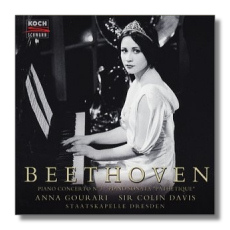
The Internet's Premier Classical Music Source
Related Links
- Beethoven Reviews
- Latest Reviews
- More Reviews
-
By Composer
-
Collections
DVD & Blu-ray
Books
Concert Reviews
Articles/Interviews
Software
Audio
Search Amazon
Recommended Links
Site News
 CD Review
CD Review
Ludwig van Beethoven

- Piano Concerto #3 in C minor, Op. 37
- Piano Sonata #8 in C minor, Op. 13 "Pathétique"
- 32 Variations on an Original Theme in C minor, WoO 80
Anna Gourari, piano
Staatskapelle Dresden/Colin Davis
Koch-Schwann 3-1499-2 DDD 65:48
This disc is a tie-in of sorts to Invincible, the new film by German director Werner Herzog. In this film, the strikingly beautiful Gourari plays the role of a Czech cabaret pianist in Berlin during the 1930s. She dreams of playing Beethoven's Third Piano Concerto in a concert hall, and her dream comes true, thanks to the intercession of a vaudeville strongman, a Polish Jew, who loves her. Koch-Schwann's booklet reproduces an early letter from Herzog to Gourari in which the director tells the pianist that he has found the perfect role for her, to please start preparing Beethoven's Third Piano Concerto, and that he won't take no for answer!
In my review of Gourari's Chopin disc (Koch-Schwann 3-1430-2), I noted that Gourari had been compared to Martha Argerich. I found the comparison apt: her playing was strong, expressive, and subjective. In short, she seemed the soul of modern-day Romanticism. This time around, Die Zeit is quoted, and in the quote, she is compared to Clara Haskil. Again, I find the comparison apt: her playing is poised, sensitive, and quietly luminous. In short, she seems the soul of modern-day Classicism. Who says that acting and musicianship are unrelated! I find the Chopin disc more exciting because few modern pianists can play that repertoire with the desired improvisatory flair, but without self-indulgence. This new recording of the Beethoven, however, while less surprising, is quite successful taken on its own terms. Restrained yet probing, this performance is one of whispered plots and shadowy intrigues. The solo works, particularly the "Pathétique," display a similar marriage of common sense and imagination. Colin Davis understands the concerto's language. The Staatskapelle Dresden's sound, on the other hand, is surprisingly unblended.
Although Beethoven loved that key, the idea of putting three works in C minor on the same disc was not a good one. Even his Fifth Symphony escapes C minor in its finale.
The concerto was recorded in Dresden's Lukaskirche, and the solo works were recorded in Munich's Bavaria Studios. The engineering is good, but not great, and better in the concerto – a live recording.
Copyright © 2002, Raymond Tuttle


















